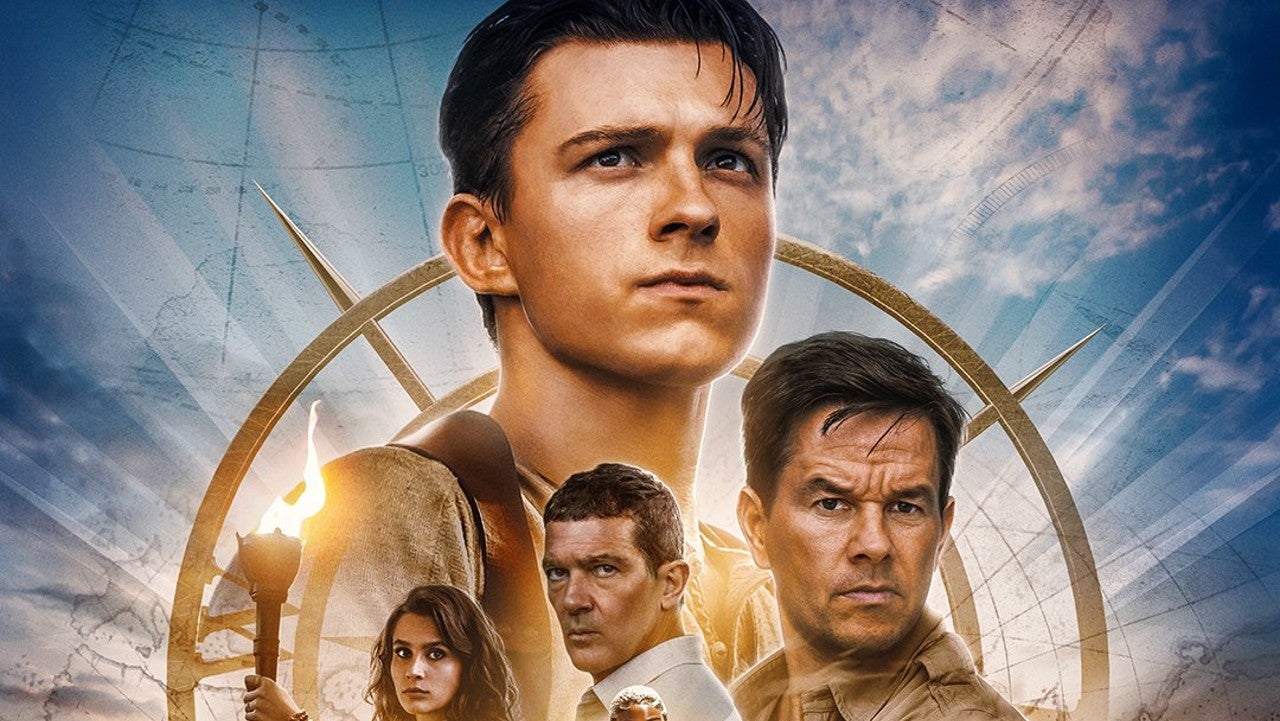FOR REFERENCE: This review of, “Uncharted” is based on a theatrical viewing
The PlayStation multimedia revolution has begun!
After many years of being the dominant player in the console video game industry, Sony’s PlayStation division is looking to take their various gaming franchises into new mediums, as adoption and celebration of video games continues to extend further into the mainstream. This initiative has manifested in the form of PlayStation Productions, an offshoot of PlayStation’s core business that’s dedicated to adapting PlayStation video games into other mediums, most notably film and TV. PlayStation Productions has been quite busy since its inception to boot, with acclaimed PlayStation video game properties like The Last of Us, Twisted Metal and God of War now in various stages of development for television, while a few other PlayStation IP’s like Ghost of Tsushima and Jak and Daxter are instead being positioned for the theatrical movie space.
Standing as the first of PlayStation Productions’ adaptations however is Uncharted, a live-action movie take on one of PlayStation’s most successful video game franchises. Developed by Virginia-based PlayStation subsidiary studio, Naughty Dog (who, consequently, also developed The Last of Us and Jak and Daxter), Uncharted is an action-adventure-shooter combo franchise about wisecracking treasure hunter, Nathan Drake, and his few begrudging allies, as they chase various historical myths and the riches supposedly connected to them, while inevitably inviting all sorts of enemies and trouble along the way. It’s a little boilerplate as far as action-adventure premises go, but lovable characters, outstanding production values and surprisingly smart storylines have helped the Uncharted games carve out a very beloved niche in the PlayStation pantheon, while also making them ripe for similarly fun live-action adaptations.
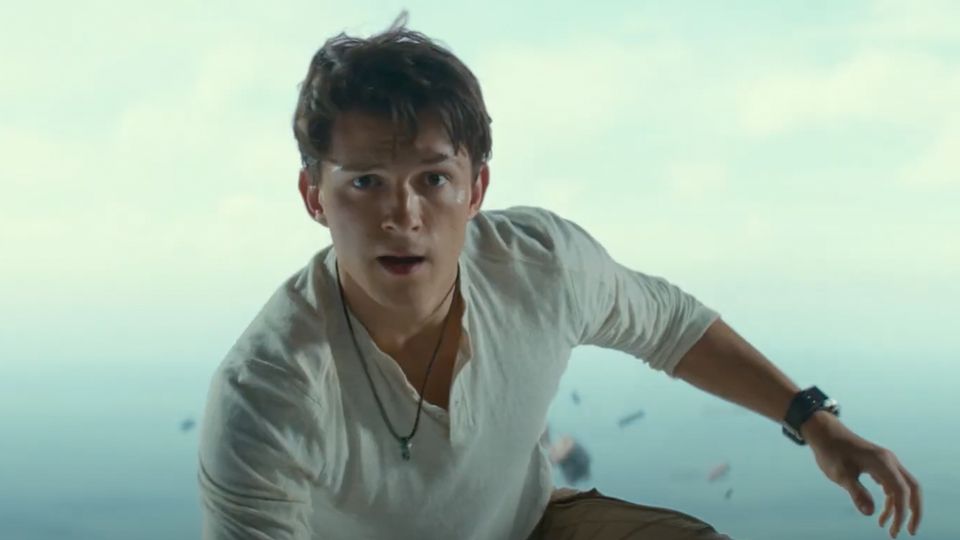
This being early days for PlayStation Productions however, Uncharted’s long-awaited movie adaptation saw a very lengthy stint in development hell! Efforts to make an Uncharted movie have been in the works since the franchise’s very first video game, Uncharted: Drake’s Fortune, first released on PlayStation 3 in 2007, and subsequently went through several iterations of directors, writers, and lead stars. Of the many people almost involved with the movie, only the original production team headed by Avi Arad, alongside Mark Wahlberg, remained involved with the final product, and even then, Wahlberg ultimately changed roles, now portraying Nathan Drake’s older ally, Victor “Sully” Sullivan, rather than Nate himself. The lead role of Uncharted would instead eventually be filled by Tom Holland, fresh off of making Sony massive bank as the studio’s latest live-action Spider-Man, portraying a younger version of Nathan Drake in an origin story detailing how he met Sully, thus serving as a prequel to the canon of the video games, and somewhat mimicking a similar origin sequence from 2011’s PlayStation 3 sequel, Uncharted 3: Drake’s Deception.
If this sounds like it’s ripped straight out of the typical Hollywood blockbuster playbook, that’s because it unmistakably is. I suppose we should be thankful that an Uncharted movie exists at all, in fairness, considering that it took well over a decade for the movie to finally hit theatres. I will say that Uncharted is certainly not the worst video game-to-film adaptation I’ve experienced as well. It’s definitely very safe, sadly lacking a lot of the action-packed appeal that defines its source games, but the charm of the characters manages to successfully translate, as do several impressive, if slightly comical set pieces. This formula is undeniably realized better in the games, and it certainly won’t turn heads among everyday moviegoers, but Uncharted nonetheless manages to avoid being a step backwards for video game adaptations, even if it also feels disappointingly conservative for PlayStation Productions’ grand debut at the movies.
Uncharted’s lead duo of Nathan Drake and Victor Sullivan should be very familiar to anyone who has played the source games, but even if that’s not you, they’re not difficult characters to understand. Nate is an orphan who has come up in the world as a charming thief, and Sully is an opportunistic treasure seeker that ultimately takes Nate under his wing, having become acquainted with Nate’s lost brother, Sam. Sam is surprisingly made a part of Uncharted’s storyline from the jump in this case, despite not debuting until the fourth mainline Uncharted game, possibly as a way to motivate Nate beyond seeking riches. Or, failing that, Sam also makes pretty reliable sequel bait, considering that PlayStation Productions’ franchise designs for Uncharted are about as subtle as Nathan Drake’s famous steel-fisted punches.
Speaking of punches, that’s a major departure from Uncharted’s source games; The lead protagonists almost never use a gun in this movie. Hell, they barely touch a gun in most cases! That’s a bit strange, considering so much of the Uncharted video games’ battles are built around gunfights, though it could be another way to prevent Nate and Sully from coming off as too rough and violent. Herein though is where you may be foreseeing a pretty prevalent issue throughout this movie; It’s petrified of offending people.
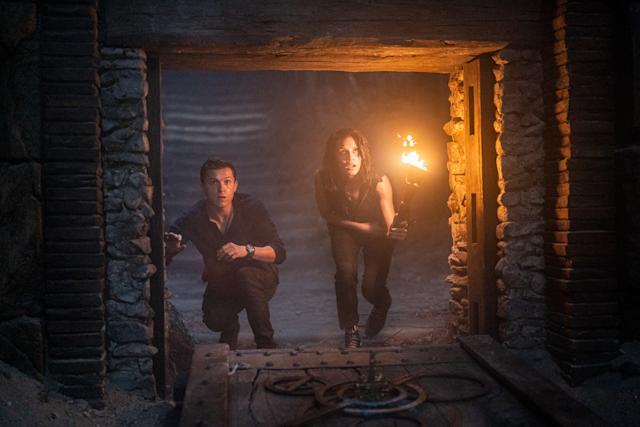
It’s certainly true that what works in a video game will not automatically work in a movie, as Wahlberg in particular no doubt learned after headlining a more ill-fated video game-adapted movie, Max Payne over a decade ago. That said, Uncharted’s surprisingly wholesome characterization and presentation run completely counter to the idea that its characters are supposed to be thieves and brigands. When Nate and Sully commit to working together, Holland’s and Wahlberg’s chemistry is perfectly fine, and even genuinely affectionate in an appealing way. When these two characters attempt to swindle and hoodwink each other however, or even the villains, it doesn’t work, because Uncharted opts to be as audience-friendly as possible. As a result, it strips out any of the edgy appeal from its source games.
These problems are especially evident when it comes to Uncharted’s villains, Santiago Moncada and Jo Braddock, played by Antonio Banderas and Tati Gabrielle, respectively, who don’t exist in the source games, and are completely made up for this movie. Banderas is particularly wasted in the role of Moncada, doing what he can to inject some personality into an extremely forgettable rich boy thug stereotype, but he’s ultimately given nothing to work with. Gabrielle fares a bit better as Braddock, but only barely. She at least manages to stand apart with her unique appearance and ruthless fighting skills, while Banderas, by contrast, is weirdly barred from properly participating in the action. Why?! Sure, it’s a bit of a trope that the main villains in the Uncharted games are often upstaged by their henchmen, but I’m not sure if a movie adaptation really needed to replicate this.
Surprisingly, as much as Holland and Wahlberg give it their all to be a convincing live-action Nate and Sully, despite their unorthodox casting, it’s actually The Wilds’ Sophia Ali that impresses the most in several scenes. Ali portrays one of Nate’s two iconic female allies from the source games, Chloe Frazer (Nate’s main love interest, Elena Fisher is absent in this movie, and no doubt being saved for a potential sequel), another opportunistic treasure hunter, and one that looks like she stepped right out of the source games. Ali clearly did her homework, because her Chloe is uncanny, ultimately allowing her to be the one character that’s convincing when she tries to screw someone over. That’s why it’s really frustrating that Chloe can often feel like a third wheel here, to the point where this movie’s climax just sort of forgets about her. Again, why?!
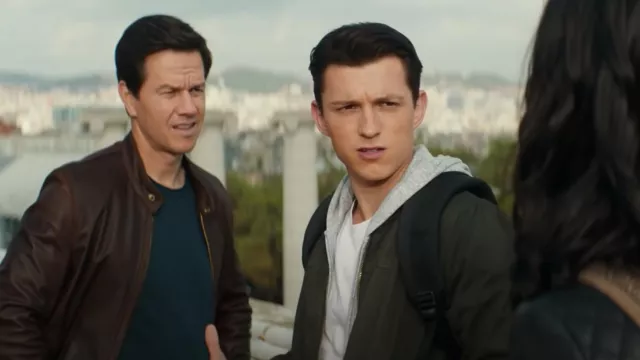
Fortunately, the easy charm of the Holland/Wahlberg dynamic still manages to carry the majority of Uncharted, even if it can’t save some of the frustrating characterization throughout the rest of this movie’s cast. Holland in particular manages to hint at greater things to come as he no doubt matures further into the role of Nate with time (assuming he gets some sequels that let him do that), and while Wahlberg’s Sully is a much bigger swing, especially when Wahlberg looks downright laughable after he tries to grow Sully’s trademark moustache towards the end (this isn’t really a spoiler, as it was all over Uncharted’s trailers), at least he’s fun. I’m getting the impression that a darker, bolder sequel could push this lead character dynamic further, but as a ‘safe’ video game adaptation, Uncharted at least manages to make Nate and Sully recognizable, if also fairly removed from how they’re often portrayed in the Uncharted games.
The Uncharted movie’s storyline represents a pretty by-the-numbers treasure hunting romp, one that takes far fewer risks than its source games. It’s also entirely devoid of the supernatural elements that are sometimes incorporated into the video games, possibly by design, as this is an origin story that presumably predates the events of the games. Instead, Uncharted’s storyline feels like it cribs narrative tropes from several other, more established treasure hunting movies, including The Goonies, National Treasure, Raiders of the Lost Ark, and even Tomb Raider, another video game franchise that’s made the leap to film, now in two separate incarnations. It’s not a terrible blend, but this liberal borrowing from other movies does sadly hold Uncharted back from effectively achieving its own identity in film.
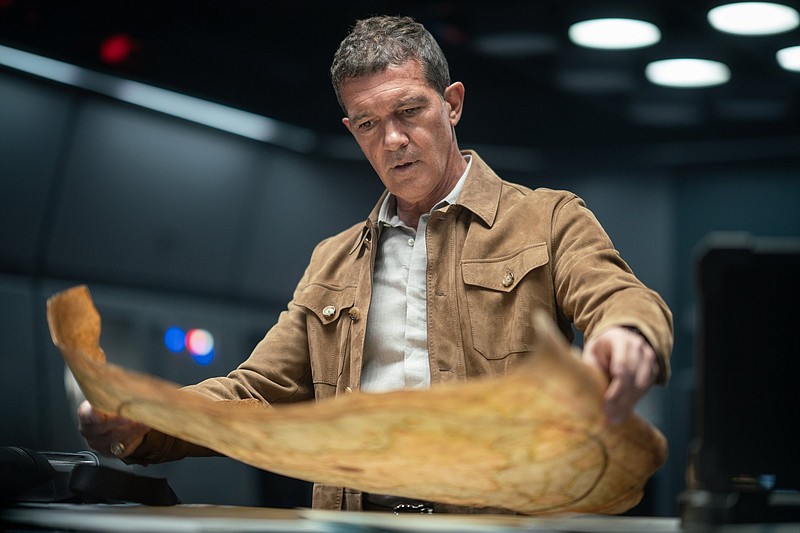
Still, Uncharted’s plot is fun in the moment, even if the source games definitely aimed higher with their more mythical mysteries. This movie adaptation meanwhile pivots to be a bit more grounded, instead revolving around a more straightforward hunt for the lost gold of Ferdinand Magellan. It’s pretty cliched and not terribly surprising, but even if you’ll no doubt wish that the storytelling was a little more ambitious, at least it’s functional, which is more than one can say about a lot of video game-to-film adaptations. Like I said, perhaps a darker, bolder sequel can take this foundation further in the future.
After the multitude of directors that attempted and eventually abandoned Uncharted, it feels perhaps fitting that Ruben Fleischer would step in to finally successfully realize this long-gestating video game adaptation. Fleischer appears to be becoming a loyal blockbuster director for Sony, after first breaking out with the studio via 2009’s Zombieland, and later launching Sony’s Spider-Man Universe with 2018’s Venom. Like Venom, Uncharted is a tentpole Sony blockbuster that feels blatantly designed by committee, for better or for worse, and Fleischer is clearly content to just do what he has to in order to get Uncharted into theatres, even if it’s clearly work-for-hire.
Also like Venom however, Fleischer is clearly hobbled by Uncharted’s PG-13 rating, which once again seems to leave him fully at the mercy of Sony’s producers. This is probably why Uncharted’s direction feels functional, without ever becoming truly impressive. It looks good enough, its action scenes are blatantly absurd, but still pretty entertaining, and most of the creative appeal is entirely shouldered by the actors. There just isn’t much to dig into here.
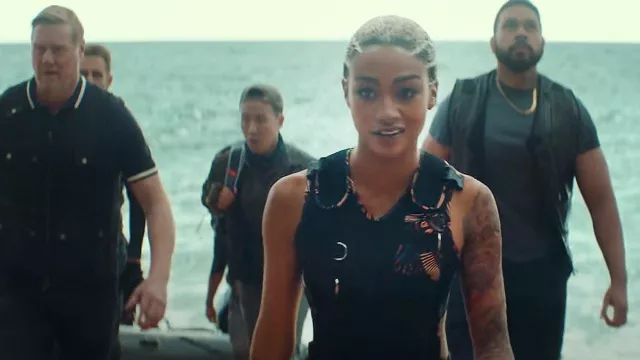
Thus, your opinion of Uncharted’s direction will probably come down to your opinion of video game-to-film adaptations in general, and probably your potential hopes for their continued existence. On the one hand, Uncharted feels fairly polished, and presents noticeably more blockbuster pedigree than most other video game-to-film adaptations tend to do. On the other hand though, Uncharted also feels so sanitized and devoid of distinction that it fails to stand out. It feels like the kind of movie that you see while you’re waiting for more ambitious and impressive blockbusters. That still places it above the frequent growing pains of your usual video game-to-film adaptations, but considering the much bigger creative swings made by recent video game-inspired movies like Pokemon: Detective Pikachu and Sonic the Hedgehog, it’s tough not to feel like more could have been done to truly cement Uncharted as a blockbuster movie that stands on its own merits.
Uncharted can’t totally escape the feeling of being a proof-of-concept for PlayStation Productions, rather than a fully independent blockbuster effort. It’s clearly being positioned to set up a headlining movie franchise for PlayStation to keep capitalizing on, while helping their adaptation arm get its feet wet so the next PlayStation game-to-film adaptation doesn’t take over a decade to complete.
As easy as it is to be critical of Uncharted’s obvious corporate agenda however, it’s still better than what many audiences have come to expect from your run-of-the-mill video game-to-film adaptation. Its lead heroes are entertaining, its action scenes are competent, and it does admittedly lend itself to sequels pretty easily, sequels that can hopefully carve out a more creative approach. As far as video game-to-film adaptations go, there are definitely worse issues to have than a failure to take risks.
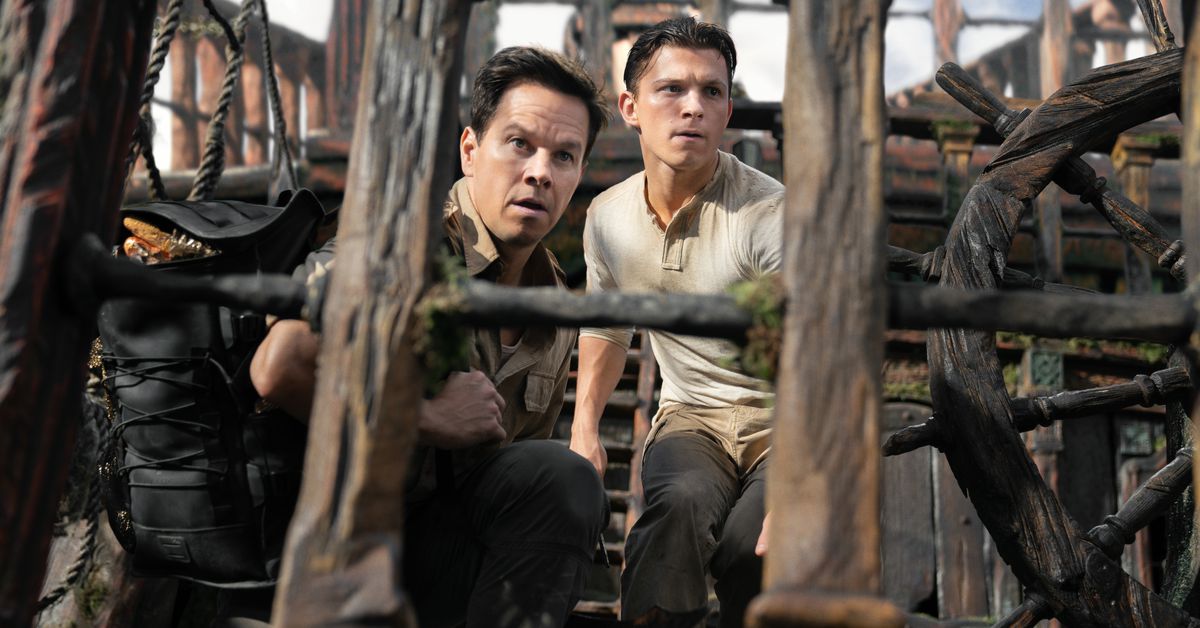
Still, that is a failure all the same. I enjoyed Uncharted while I was watching it, and I won’t deny that. That doesn’t change the fact that I’ve seen almost everything in this movie before though. Even Nathan Drake would raise an eyebrow at how often Uncharted steals its ideas from other movies! This cobbled-together approach may make for a functional franchise vehicle, which has to be the bare minimum of what PlayStation Productions probably expected, but If Uncharted truly wants to join the big leagues of Hollywood blockbusters, it needs to put its journal away, and stop chasing the legacies of the more novel cinematic explorers that came before it.

